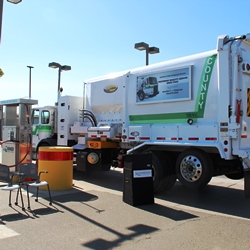Sacramento County’s Fleet Services Division has a new chief, Keith Leech. Responsible for more than 2,300 vehicles and pieces of equipment ranging from patrol cars to customized trucks for animals, to oversized dozers that compress trash at the landfill, Leech has his work cut out for him.
“With an estimated replacement value of $104M, it’s essential that we strategically manage these assets to get the best use out of the equipment and the dollars we spend,” Leech said. “We have to use best fleet management practices, and fine-tune our practices to make data-driven decisions when we’re deciding on how long to keep equipment, if it should be replaced, and with what. We can save a lot of money in equipment costs and down time if we manage our fleet assets like a business.”
Managing a large fleet is about more than fixing cars; as well as repairs of a wide variety of sophisticated equipment, it involves finding the best sources for fuel and vehicles, forecasting and budgeting for investment in the future, providing fueling stations and purchasing millions of gallons of fuel every year, and maintaining a highly trained certified crew.
Current operations include:
-
Approximately 2,300 light and heavy fleet rental units with an estimated replacement value of $104 million, plus 800 department-owned units that need to be serviced
-
11 shops
-
104 employees
-
12 fuel stations with fuel capacity of roughly 202,000 gallons
-
193,500 fuel transactions a year
-
1.4M gallons of gas yearly
-
648,000 gallons of diesel every year
-
24,296,581 miles traveled annually (excludes Sanitation District Agency)
 By using technology to extract information that vehicles generate, the fleet can be better diagnosed and managed, Leech said. For example, when there’s a fault code that is a predictor of catastrophic failure – reading that data can help us preemptively avoid down time and costly repairs, especially with specialized vehicles such as the $750,000 Sewer Vacuum Truck and the $1.2M landfill dozers. “It’s not like we have extras of those sitting around,” Leech said.
By using technology to extract information that vehicles generate, the fleet can be better diagnosed and managed, Leech said. For example, when there’s a fault code that is a predictor of catastrophic failure – reading that data can help us preemptively avoid down time and costly repairs, especially with specialized vehicles such as the $750,000 Sewer Vacuum Truck and the $1.2M landfill dozers. “It’s not like we have extras of those sitting around,” Leech said.
Maintaining such a large and diverse fleet is now a high-tech operation – especially with the diagnostic computers – and requires a highly-trained crew. “With the changing landscape, Leech is not only assessing the skills that will be required in the future, but will work closely with the departments he serves to explore opportunities for greater efficiencies and automation,” said Michael Morse, Director of theGeneral Services Department where Fleet Services resides.
Leech notes that the County has already done a great deal of solid work in fleet management – especially in the area of sustainability:
-
300 Prius and hybrid cars with more coming in
-
60% of fuel consumption is alternative fuels
-
Reduced unnecessary use of vehicles
-
Anti-idling policy in place
-
Altering work schedules or trips to coincide with low density traffic times
-
Redesigning work routes for more fuel efficiency
-
Creating motor pools for departments to share and rent vehicles rather than purchasing
-
A brand new $1.8 million CNG fuel station was completed in July 2015 – the first combined time fill/fast fill compressed natural gas fueling station
Sacramento County was recognized as #25 Government Green Fleet Award in North America on September 24, at the Midwest Green Fleet Forum & Expo in Columbus, Ohio. “My goal is to add to the work the County has done and bring the Division to the top ranked fleet in the nation,” Leech said. “To get there, we want to improve the use of data, automate processes where we can, expand our CNG fuel operations, obtain less costly sources of renewable fuels, expand fleet electrification and invest in our employees.”





